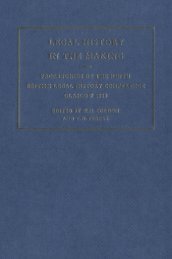130. - Collection Point® | The Total Digital Asset Management System
130. - Collection Point® | The Total Digital Asset Management System
130. - Collection Point® | The Total Digital Asset Management System
You also want an ePaper? Increase the reach of your titles
YUMPU automatically turns print PDFs into web optimized ePapers that Google loves.
82 Structure and the Book ofZechariah<br />
14. "IDK is a common word here, throughout Zechariah, and in the<br />
rest of the Hebrew Bible. <strong>The</strong>re is nothing in its use here to make it<br />
significant. We may discount it, together with the following items, for<br />
similar reasons: 16, 22, 27, 28, 31, 41, 43 (for 15 see 54 below).<br />
17. DK plays an important part in vv. 1-6 (only).<br />
18. ro always occurs as part of the introductory formula, 'thus says<br />
Yahweh (Sebaoth)'. This phrase must be considered. 1<br />
19. n«ns. <strong>The</strong> heavy emphasis in v. 3 on 'Yahweh Sebaoth' suggests<br />
that this title has special significance for Zechariah. It seems to be<br />
entirely appropriate for this chapter with its 'holy war' atmosphere.<br />
20. 310 is important in vv. 1-6: the fathers were exhorted to turn<br />
but refused; a new offer is made 'return to me and I will return to<br />
you'. <strong>The</strong>n at the end of this chapter Yahweh reports that 'he has<br />
(re)turned to Jerusalem'. Is this a prophetic perfect? 2<br />
21. DR3 occurs only as part of the formula 'oracle of Yahweh<br />
(Sebaoth)'. It is not important in itself.<br />
23. R"ip is used only three times: in v. 4 to refer to the 'calling' of the<br />
former prophets to the fathers—without success. <strong>The</strong>re is a contrast<br />
with this in vv. 14, 17 where the prophet is told to call (to an unspecified<br />
audience, cf. Isaiah 40, especially v. 6) with a message of comfort;<br />
the complaint 'How long?' is answered at last (v. 14, cf. v. 12), the<br />
nations will be punished and (v. 17) Jerusalem will be blessed.<br />
24. i~n is used twice here, vv. 4 and 6, paired with "j^pua, 3 to<br />
describe ways/doings of the fathers and probably, in v. 6, those of<br />
1. Several scholars give attention to this feature, which is, of course, an important<br />
object for form-critical study. See e.g. Meyers, Haggai, Zechariah, pp. lii-liii.<br />
2. Baldwin aptly comments: <strong>The</strong> words / have returned to Jerusalem would<br />
recall Ezekiel's vision of the departure of the Lord from the Temple (10.18-19;<br />
11.23) and of His return (43.5). His presence is a pledge that the Temple will be<br />
finished' (Haggai, Zechariah, Malachi, p. 100). This seems a better understanding<br />
than that of Rudolph, Petersen and others who translate by a present tense ('Ich<br />
wende mich. ..', Rudolph, Haggai, p. 72; 'I am returning. ..', Petersen, Haggai<br />
and Zechariah, p. 137) or the slightly unnatural explanation of Meyers that<br />
'Yahweh's presence is to be manifest' now that temple building has been resumed,<br />
as in Haggai, cf. Zech. 1.7 (Haggai, Zechariah, pp. 122-23).<br />
3. It is generally agreed that DD'^nm, the qere with mem restored, is the best<br />
reading here. <strong>The</strong> word remains in the table with or without the mem, or even if we<br />
accepted the kethib (from "T'TMD, which is not otherwise attested) since it is so similar<br />
in sound. See, e.g., Rudolph, Haggai, p. 66; Petersen (who, however, has some<br />
confusing printing errors), Haggai and Zechariah, p. 127.






